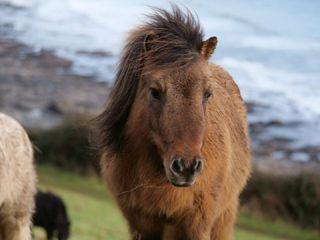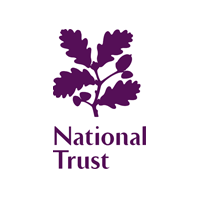Conservation Grazing on the Roseland
Happy New Year!
We hope you had a very pleasant Christmas break and are looking forward to a fresh start in 2023.
Over the Christmas period one of our main tasks, whether we are on annual leave or not, is checking our in-hand livestock. Like any livestock manager this is a daily must and cannot be forgotten. Animal welfare is a top priority.

We own 13 ponies, 5 Dartmoors and 8 Shetlands, split into 3 grazing groups. The Dartmoors stay on the Dodman grazing three different compartments throughout the year.
We have two very elderly Shetland ponies, Fred and Ginger, who originated from a herd at Arlington that was dispersed across various different Cornwall NT properties several years ago. Their passports state they were born in 1975 making them 47!! These two are great for our smaller sites and also where we need to use electric fence as they don’t scare easily and are well used to lots of people/dog activity. They graze the Jacka at Portloe, St Anthony meadow and Towan meadow.
In 2017 we purchased 6 new Shetland ponies from a stud on Dartmoor. This was partly in preparation for the two old Shetlands not being around for ever but they are still proving us wrong there!! Coming from Dartmoor we knew they would be hardy and used to grazing rough ground, and being out all year in potentially harsh conditions. Diesel, Dazzling, Cynthia, Humbug, Gooseberry and Excelsior graze Treluggan, the Blouth and Lambsowden. Two of these sites are in Higher Level Stewardship and because of this only grazed during the winter months.
Our management of the ponies includes an annual vet check, regular hoof trimming where required, monitoring of parasites and keeping a detailed log of all movement and treatment.
They are key to keeping our sites in an excellent condition for wildlife to thrive. Keeping on top of scrub, gorse and brambles. Their dung provides an invaluable home for rare insects such as the Hornet robberfly and dung beetles. They create areas of bare ground where they roll, perfect for basking butterflies and dust bathing birds. But do less poaching than cattle or sheep.
It is almost a full time job just checking the ponies who are usually spread across the extent of our property. We are looking to ask volunteers who regularly visit these sites, maybe walk their dogs regularly there, to help us keep an eye on our fury conservation heroes. You don’t need to be an equine expert, training will be provided, and we would only ask for a day or two a week for an hour or less depending on the site. A great excuse to get out and enjoy a walk along the coast. If you would be interested in pony lookering for the National Trust please email roseland@nationaltrust.org.uk
Thank you!

